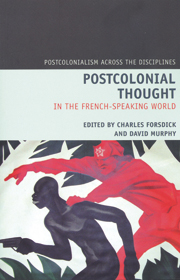Book contents
- Frontmatter
- Contents
- Acknowledgements
- Introduction: Situating Francophone Postcolonial Thought
- Section 1 Twelve Key Thinkers
- Section 2 Themes, Approaches, Theories
- 13 Postcolonial Anthropology in the French-speaking World
- 14 French Theory and the Exotic
- 15 The End of the Ancien Régime French Empire
- 16 The End of the Republican Empire (1918–62)
- 17 Postcolonialism and Deconstruction: The Francophone Connection
- 18 Negritude, Présence Africaine, Race
- 19 Francophone Island Cultures: Comparing Discourses of Identity in ‘Is-land’ Literatures
- 20 Locating Quebec on the Postcolonial Map
- 21 Diversity and Difference in Postcolonial France
- 22 Colonialism, Postcolonialism and the Cultures of Commemoration
- 23 Gender and Empire in the World of Film
- 24 From Colonial to Postcolonial: Reflections on the Colonial Debate in France
- Notes on Contributors
- Bibliography
- Index
20 - Locating Quebec on the Postcolonial Map
from Section 2 - Themes, Approaches, Theories
- Frontmatter
- Contents
- Acknowledgements
- Introduction: Situating Francophone Postcolonial Thought
- Section 1 Twelve Key Thinkers
- Section 2 Themes, Approaches, Theories
- 13 Postcolonial Anthropology in the French-speaking World
- 14 French Theory and the Exotic
- 15 The End of the Ancien Régime French Empire
- 16 The End of the Republican Empire (1918–62)
- 17 Postcolonialism and Deconstruction: The Francophone Connection
- 18 Negritude, Présence Africaine, Race
- 19 Francophone Island Cultures: Comparing Discourses of Identity in ‘Is-land’ Literatures
- 20 Locating Quebec on the Postcolonial Map
- 21 Diversity and Difference in Postcolonial France
- 22 Colonialism, Postcolonialism and the Cultures of Commemoration
- 23 Gender and Empire in the World of Film
- 24 From Colonial to Postcolonial: Reflections on the Colonial Debate in France
- Notes on Contributors
- Bibliography
- Index
Summary
Quebec and postcolonial studies
In his introduction to a 2003 issue of Québec Studies, Vincent Desroches poses the question, for the first time in the context of a serious theoretical discussion: ‘En quoi la littérature québécoise est-elle postcoloniale?’ [In what sense can Quebec literature be deemed postcolonial?] (2003b). It is not surprising that this question, framed in French by a Québécois scholar, is given serious consideration in a journal published in the United States: in US academic circles Quebec literature had, for at least a decade, been associated with the postcolonial, however loosely defined. Yet within Quebec itself the term ‘postcolonial’ is still largely ignored, and the theoretical approach it evokes often rejected as a new attempt to impose Anglophone critical hegemony on a Francophone literature. The question posed by Desroches and the responses it has inspired have done much to clarify the terms of the debate, launching critical discussion of the complex ways in which Quebec can be considered postcolonial in a historical sense, as well as a reflection on the ways in which postcolonial readings of Quebec literature can be useful, although not without their dangers.
Since postcolonial studies, and especially the work of Gayatri Chakravorty Spivak, teaches us the importance of situating the critic, I must confess my own involvement in locating Quebec within the postcolonial. In 1996, as Desroches mentions, I was part of an editorial group that included women writers from Quebec in an essay collection entitled Postcolonial Subjects: Francophone Women Writers, a title that juxtaposes the terms ‘postcolonial’ and ‘Francophone’.
- Type
- Chapter
- Information
- Postcolonial Thought in the French Speaking World , pp. 248 - 258Publisher: Liverpool University PressPrint publication year: 2009

